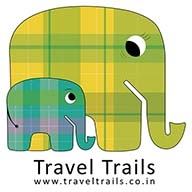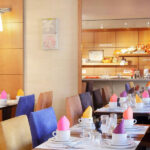Students who have completed their 12th Standard or graduation and possess German proficiency at Level B1/B2 can apply for Ausbildung programs in Germany through us. We assist students with their admission process, visa procedures, and post-arrival requirements.
Study in Germany, the education wing of Travel Trails (India) Pvt. Ltd., has successfully provided admission assistance to students in various fields, including Hotel Management, Sales Assistant, Manager Assistant – Tourism and Leisure, Metal Technician, and Nursing.
Specialist for Restaurants and Event Catering
Occupation: Recognised training occupation (Ausbildung)
Type of training: Dual training in the hospitality industry (regulated by training ordinance)
Duration of training: 3 years
Places of learning: Training company and vocational school (dual training)
What do you do in this profession?
Restaurant and event catering professionals set and decorate tables, welcome guests and make recommendations for food and beverage choices. In doing so, they cater to the individual wishes and needs of the guests. Furthermore, they take orders, serve food and drinks, prepare the bill and cash up. They often also work at the bar and drinks buffet, preparing and serving drinks. They also organise meetings and special events such as weddings or banquets and ensure that everything runs smoothly.
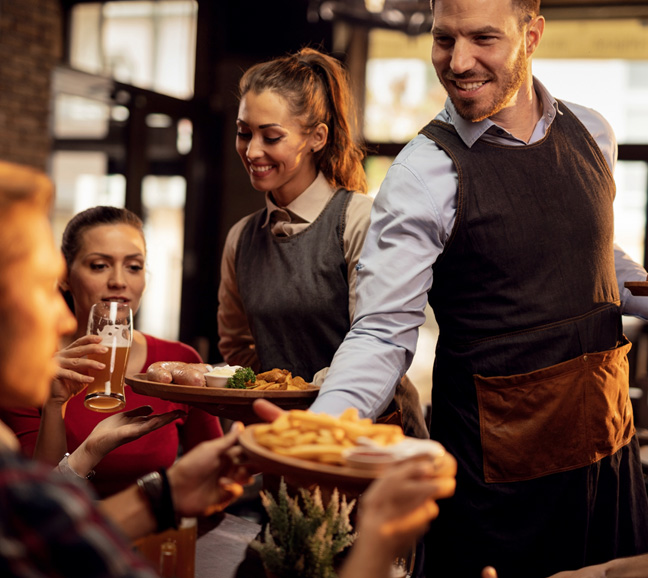
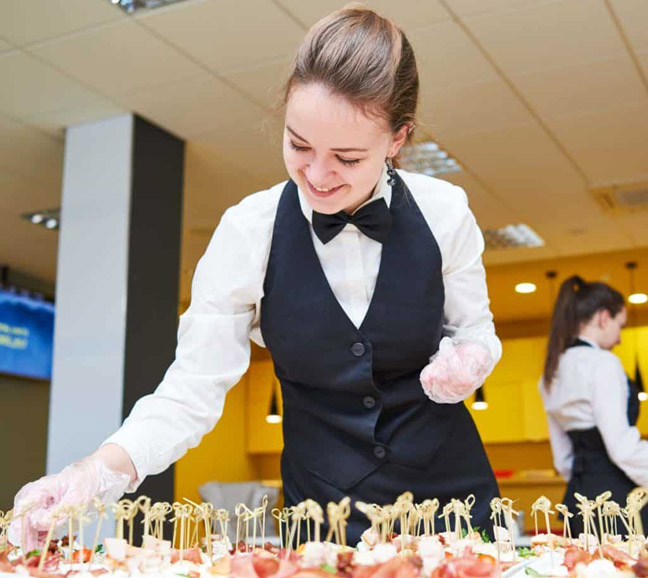
Specialist for Gastronomy
Occupation: Recognised training occupation (Ausbildung)
Type of training: Dual training in the hospitality industry (regulated by training ordinance)
Duration of training: 2 years
Places of learning: Training company and vocational school (dual training)
What do you do in this profession?
Catering specialists serve guests and act in a service-oriented and sales-promoting manner. For example, they take orders in the restaurant and serve drinks and food, serve drinks at the bar or sell food at the counter. They decorate tables for special occasions and according to the season and set up buffets. In the kitchen, they prepare simple dishes, garnish cold plates or arrange the breakfast buffet. Checking stock levels and the usability of food stuffs is also one of the tasks of skilled workers for the catering trade.
Kitchen Specialist
Occupation: Recognised training occupation (Ausbildung)
Type of training: Dual training in the hospitality industry (regulated by training ordinance)
Duration of training: 2 years
Places of learning: Training company and vocational school (dual training)
What do you do in this profession?
On the one hand, kitchen specialists deal with the preparation and post-processing of dishes. On the other hand, they prepare salads and desserts and prepare, for example, simple soups, sauces, side dishes as well as meat, fish and vegetable dishes using professional kitchen technology. They work closely with the cooks in the kitchen and observe the current regulations on hygiene and sustainability when handling food. In service and stewarding, they look after customers by cleaning the guest rooms, serving dishes and taking requests or complaints. In addition, kitchen specialists are responsible for receiving and storing products and ingredients, thus ensuring the quantity and quality of stocks.

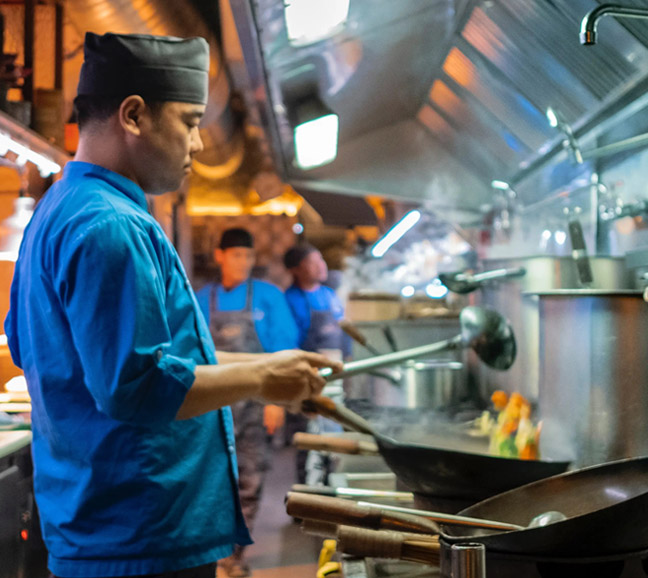
Cook
Occupation: Recognised training occupation (Ausbildung)
Type of training: Dual training in the hospitality industry (regulated by training ordinance)
Duration of training: 3 years
Places of learning: Training company and vocational school (dual training)
What do you do in this profession?
Cooks do all the work that goes into making food. Once they have drawn up a menu, they buy food and ingredients, prepare them or store them if necessary. They organise the work processes in the kitchen and ensure that the dishes are finished on time and in the right order. In smaller kitchens, cooks cook, fry, bake and garnish all dishes themselves. In large kitchens, they usually specialise in preparing certain dishes, such as side dishes, salads or fish and meat dishes. Their tasks also include calculating
Specialist for Metal Technology
Occupation: Recognised training occupation (Ausbildung)
Type of training: Dual training in the hospitality industry (regulated by training ordinance)
Duration of training: 2 years
Places of learning: Training company and vocational school (dual training)
What do you do in this profession?
Specialists in metal technology manufacture components, assemblies or constructions made of metal. They process metal parts using different processes and assemble them. The tasks of metal technology specialists in the above-mentioned disciplines can be found in the individual descriptions.


Logistics
Occupation: Recognised training occupation (Ausbildung)
Type of training: Dual training in the hospitality industry (regulated by training ordinance)
Duration of training: 2 years
Places of learning: Training company and vocational school (dual training)
What do you do in this profession?
Warehouse clerks accept goods and check the type, quantity and quality of the deliveries on the basis of the accompanying documents. They record the goods, unpack them, check their condition, sort and store them properly or forward them to their destination in the company. In doing so, they make sure that the goods are stored in optimal conditions. At regular intervals, they check the stock level and carry out inventories. For shipping, they pack goods, fill out accompanying documents, assemble delivery units and load trucks.
They mark, label and secure shipments. In doing so, they comply with relevant regulations, such as the Dangerous Goods Ordinance and customs regulations. They transport the goods with the help of transport equipment and means of transport, such as forklifts or sorting systems.
Professional Driver
Type of training: Dual training in freight transport and passenger transport
Duration of training: 3 years
Places of learning: Training company and vocational school (dual training)
What do you do in this profession?
Professional drivers in freight transport transport goods of various kinds, e.g. industrial products, consumer goods, building materials, wood, fuels or heating oil, mainly by truck (=LKW).
In passenger transport, for example, they work as bus drivers in regular or tourist transport. They spend a lot of time behind the wheel and know the rules of the road at home and abroad. Before starting the journey, they carry out a pick-up and departure check on the vehicle. In doing so, they check, for example, the wheels, the engine and the functionality of the brake systems. They then accept the passengers’ goods or luggage. They ensure that the weight of the load is evenly distributed and check the documents to be carried and the signage of the vehicle that may be required depending on the cargo.
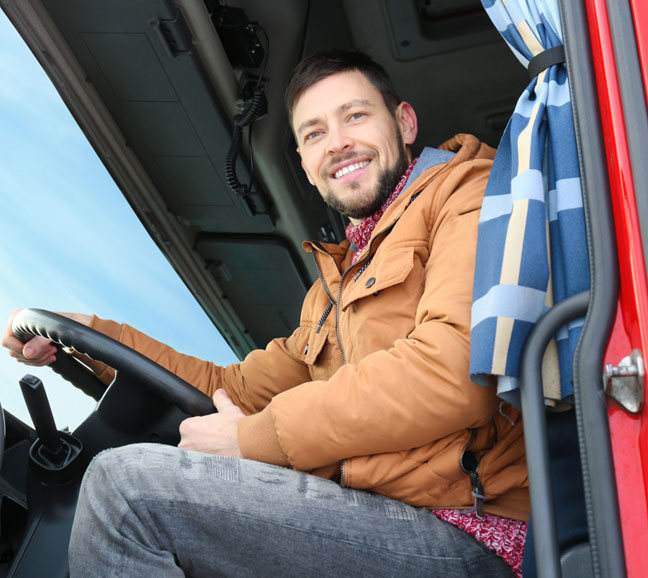

Nurse
Type of training: Training at nursing schools
Duration of training: 3 years
Places of learning: Nursing school, hospitals, care facilities
What do you do in this profession?
Nurses care for people of all ages in nursing, pediatric nursing, and geriatric care. In basic care, they bed people in need and support them with food intake and personal hygiene. In outpatient care, nurses also work with relatives and instruct them, for example, in nursing techniques.
In coordination with the doctors, they treat wounds, for example, and carry out infusions, blood samples and punctures. They also assist with examinations, administer medically prescribed medication or injections to patients and prepare them for surgical measures. In addition, they take on organisational and administrative tasks such as the determination of care needs and the planning, coordination and documentation of care measures. They are also involved in patient admission, quality assurance and the management of the medicament inventory.
Nursing Assistant
Type of training: School-based training or dual training possible
Duration of training: 2 years
Places of learning: Vocational school and company
What do you do in this profession?
Nursing assistants help people in need of care with personal hygiene, dressing, food and fluid intake and motivate them to exercise. They also look after people in need of help in their everyday lives and, for example, participate in day-structuring measures or support them in the care oftheir living spaces.
On the instructions of nurses, they measure patients’ vital signs such as blood pressure, pulse, and body temperature, perform blood glucose checks, or distribute and administer medication. They monitor the condition of patients and call in nurses in crisis situations. In life-threatening situations, they initiate life-saving immediate measures. The accompaniment of seriously ill and dying people as well as their caregivers can also be part of the area of responsibility. Nursing assistants record the care measures carried out, the values determined and their own observations in the nursing documentation.


Management Assistant for Tourism and Leisure
Occupation: Recognised training occupation
Type of training: Dual training in commerce (regulated by training ordinance)
Duration of training: 3 years
Places of learning: Training company and vocational school (dual training)
What do you do in this profession?
Tourism and leisure clerks develop, mediate and sell tourism products and services. They coordinate and market tourism and leisure offers, taking into account the wishes of the target groups and customers, plan events and ensure their organisation. They work closely with local partners, build and maintain networks. They also inform and advise interested parties – if necessary in a foreign language – on the tourist and cultural offers of a region or place, and take reservations and bookings. For example, they provide information on the opening hours of local
Sales Assistant
Occupation: Recognised training occupation (Ausbildung)
Type of training: Dual training in the hospitality industry (regulated by training ordinance)
Duration of training: 2 years
Places of learning: Training company and vocational school
(dual training)
What do you do in this profession?
Depending on the company or department, sales assistants deal with clothing, food or consumer electronics, for example. They accept deliveries ofgoods, sort goods, put them on shelves and draw prices. They regularly carry out quality controls, check stock levels and reordergoods.
Their main task is to conduct sales and help and consult customers. When cashiering, salespeople check the authenticity of the banknotes, make sure that the change is spent correctly or process cashless payments with credit or debit cards. In addition, they are involved in the planning and implementation of advertising and sales promotion measures.

